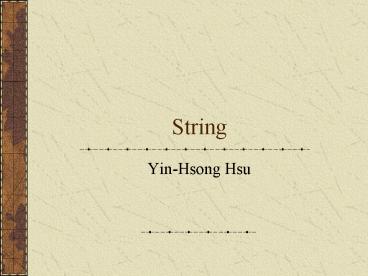String - PowerPoint PPT Presentation
1 / 32
Title:
String
Description:
Concatenate (combine strings) I/O. Unfortunately ... What You Can't Do. Strings are arrays ... Appending and Concatenation. To append means to place one string ... – PowerPoint PPT presentation
Number of Views:34
Avg rating:3.0/5.0
Title: String
1
String
- Yin-Hsong Hsu
2
Overview
- String constants
- Null-terminated array representation
- String library ltstring.hgt
- String initializers
- Arrays of strings
3
Character Data in Programs
- Names, messages, labels, headings, etc.
- All of these are common in computer applications
- All involve characters usually multiple
characters - So far, our ability to handle these things in C
is very limited
4
Characters and Strings
- Character constants (literals) single quotes
- a, A, 0, 1, \n, , I, \0
- String constants (literals) double quotes
- Bill is very rich
- The answer is .2f.\n
5
String Representation
- Strings are stored in char arrays
- Programming convention a null character \0 is
stored at the end
6
\0 in Strings
- \0 is not included in strings automatically
- \0 is included in string constants
automatically - Programmer must take pains to be sure \0 is
present elsewhere when needed
7
Leaving Room for \0
- Character arrays holding strings must have room
for \0 following the actual data - The empty string occupies 1 char
- Character and string constants are not the same
- x and x are different. How?
8
String Operations
- Common needed operations
- Copy (assignment)
- Compare
- Find length
- Concatenate (combine strings)
- I/O
- Unfortunately
9
What You Cant Do
- Strings are arrays
- They have the limitations of arrays
- Cant assign one string to another with
- Cant compare strings with , lt
- But there are library functions to help do such
things
10
String Library ltstringsgt
- Standard C includes a library of string functions
- Use include ltstring.hgt
- Library functions
- Require proper null-terminated (\0) strings as
arguments - Produce null-terminated strings as results
(usually)
11
String Length strlen
- strlen returns the length of its string argument
- Does not count the null \0 at the end
- Examples
- The length of A is 1
- The length of is 0
- K strlen(null-terminated string)
- stores 22 in k
12
A strlen implementation
13
String Assignment strcpy
- strcpy ( dest, source)
- Copies characters from source to dest
- Copies up to, and including the first \0 found
- Be sure that dest is large enough to hold the
result!
14
String Assignment Examples
- include ltstring.hgt
- char medium21
- char big1000
- char small5
- strcpy(medium, Four score and seven)
- medium Four score and seven\0
15
String Assignment Examples
char medium21 char big1000 char
small5 strcpy(big, medium) strcpy(big,
Bob) big Four score and seven\0??? big
Bob\0???
16
String Assignment Dangers
char medium21 char big1000 char
small5 strcpy(small, big) strcpy(small,
medium) / danger / big Bob\0? big Four
score and seven\0
17
A strcpy implementation
/ copy source string into dest, stopping with
'\0' / void strcpy(char dest , char source )
int i 0 while (source i ! '\0')
dest i source i i dest i
'\0'
18
Appending and Concatenation
- To append means to place one string directly
after another - "chop" appended to "lamb" should result in
"lambchop" - Also referred to as concatenation
19
String Concatenation strcat
- ltstring.hgt function
- strcat(dest, source)
- Appends characters from source to dest
- Copy is stored starting at first \0 in dest
- Copies up to, and including the first \0 in
source - Be sure that dest is large enough!
20
Using strcat (1)
21
Using strcat (2)
22
String Comparison strcmp
- strcmp(s1, s2)
- Compares s1 to s2 and returns an int describing
the comparison - Negative if s1 is less than s2
- Zero if s1 equals s2
- Positive if s1 is greater than s2
23
Comparing Strings
- strcmp compares corresponding characters until it
finds a mismatch. - "lamb" is less than "wolf"
- "lamb" is less than "lamp"
- "lamb" is less than "lambchop"
24
Using strcmp (1)
- Don't treat the result of strcmp as a Boolean!
- Test the result as an integer
- if (strcmp(s1,s2) 0)
- printf("same\n")
25
Using strcmp (2)
- If you treat the result of strcmp as a Boolean,
it might not do what you expect - if (strcmp(s1,s2))
- printf("yikes!")
- prints yikes if s1 and s2 are different!
26
String I/O
- scanf and printf can read and write C strings
- Format code is s
- printf assumes '\0' is present
- scanf will automatically insert '\0' at the end
- Be sure the array has room for it!
27
Spot the Security Hole
- define MAX_INPUT 200
- char buffer MAX_INPUT
- scanf("s", buffer)
28
Many Functions in ltstring.hgt
- strcat, strncat concatenation
- strcmp, strncmp comparison
- strtod, strtol, strtoul conversion
- Lots of others check your favorite reference.
- Related useful functions in ltctype.hgt
- operations on a single char
- convert case (to upper or lower)
- check category (is char a number, etc.) many
others
29
Using Libraries of Functions
- To use strings effectively in C, use functions
from string.h - Using libraries is very typical of C programming
- ANSI C standard libraries such as stdio.h,
string.h, ctype.h, math.h - Application-specific libraries (thousands of
them exist) - You cant be an effective programmer without
being able to quickly master new libraries of
functions
30
Bonus String Initializers
31
Bonus Arrays of Strings
32
Strings Summary
- Definition Null-terminated array of char
- Strings are not fully a type of C
- They share most limitations of arrays
- scanf/printf s
- ltstring.hgt library functions
- Assignment strcpy
- Length strlen
- strcat and many others
- Major Pitfall overrunning available space































